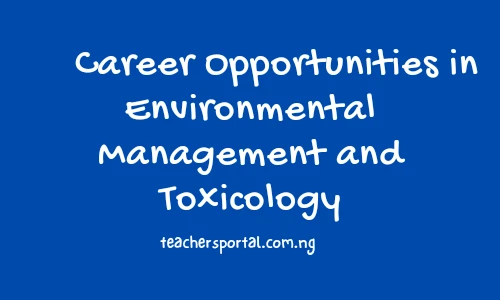In this article, we’ll explore various career opportunities in Environmental Management and Toxicology. If you’re interested in protecting the environment and human health, this guide will help you discover potential paths in this field. Let’s dive in!
Career Opportunities In Environmental Management And Toxicology (List)
- Environmental Consultant
A career in Environmental Management and Toxicology offers a range of rewarding opportunities, and one prominent avenue is that of an Environmental Consultant. These professionals play a pivotal role in bridging the gap between businesses and environmental responsibility. Environmental consultants collaborate with various industries and organizations to ensure compliance with stringent environmental regulations. They meticulously assess the potential environmental impacts of their clients’ operations, identifying areas where improvements are necessary to reduce ecological harm.
Environmental consultants are tasked with the development and execution of comprehensive environmental management plans. These plans are crucial for minimizing ecological footprints and mitigating toxicological risks associated with industrial activities. By applying their expertise, consultants help businesses operate sustainably while safeguarding the environment. This career path not only offers a chance to make a positive impact on our planet but also provides a dynamic and intellectually stimulating work environment as consultants continuously adapt to evolving environmental standards and practices.
- Environmental Engineer
A career in Environmental Management and Toxicology offers diverse opportunities, including the role of an Environmental Engineer. These professionals are instrumental in creating solutions that safeguard our environment. Environmental engineers specialize in designing, building, and managing systems aimed at environmental protection. They tackle a wide array of projects, ranging from improving water and air quality to managing waste effectively and preventing pollution.
In the aspect of water quality, environmental engineers develop innovative systems to purify and conserve this precious resource. They ensure that communities have access to clean drinking water while preserving aquatic ecosystems. In the domain of air quality, they devise strategies to reduce emissions and combat pollution, contributing to healthier and cleaner atmospheres. Waste management is another crucial facet of their work, as they design sustainable methods for handling and disposing of waste materials, minimizing environmental impact.
- Environmental Scientist
Within the field of Environmental Management and Toxicology, the role of an Environmental Scientist stands out as a key position. These professionals are dedicated to comprehending the intricacies of our natural world and the ways in which human activities affect it. Environmental scientists engage in a variety of tasks, including data collection, in-depth research, and the formulation of vital environmental policies.
Their primary focus lies in assessing the health of ecosystems, studying biodiversity, and tracking environmental changes over time. Through data collection and analysis, they gain valuable insights into the impact of human actions on the environment. This knowledge serves as a foundation for recommending sustainable practices and developing policies aimed at preserving and restoring ecological balance.
- Toxicologist
In the field of Environmental Management and Toxicology, the role of a Toxicologist holds significant importance. These professionals specialize in the study of how chemicals impact living organisms. They operate in various sectors, including research, product development, and government regulation.
Toxicologists delve deep into the intricate interactions between chemicals and biological systems, assessing the potential risks and consequences of exposure. Their research plays a crucial role in evaluating the safety of consumer products, pharmaceuticals, and industrial substances. In product development, they contribute to designing safer and more environmentally friendly products.
Additionally, toxicologists are pivotal in government regulation, where they establish guidelines and standards to protect public health and the environment from hazardous substances. Their work ensures that industries adhere to safety protocols and that the products we use are safe.
- Health and Safety Officer
Health and Safety Officers play a crucial role in safeguarding the well-being of workers across diverse environments. Their primary responsibility involves developing and enforcing safety procedures to mitigate risks and protect employees. They conduct thorough inspections to ensure compliance with safety standards and regulations, actively identifying potential hazards and taking preventive measures.
In the unfortunate event of accidents or incidents, Health and Safety Officers step in to investigate and determine the causes, aiming to prevent similar occurrences in the future. Their work spans across industries, from construction sites to office spaces, ensuring that workplaces maintain high safety standards to protect workers’ health.
- Environmental Educator
Environmental Educators play a vital role in raising awareness and promoting responsible environmental stewardship. These professionals are dedicated to educating individuals about environmental issues and instilling a sense of responsibility towards the planet. They can be found in various settings, including schools, museums, and other educational organizations.
Environmental educators design and deliver engaging programs, lessons, and activities that help people of all ages understand the importance of environmental conservation. They empower individuals with knowledge and practical skills to make eco-conscious choices in their daily lives. Whether it’s teaching students about ecosystems in a classroom or leading interactive exhibits in a museum, their work contributes to a more environmentally conscious society.
- Sustainability Manager
Within the realm of Environmental Management and Toxicology, a captivating career option is that of a Sustainability Manager. These professionals are instrumental in driving positive change within organizations, steering them toward a more sustainable future. Sustainability managers are responsible for crafting and executing strategies that enhance an organization’s eco-friendliness. Their efforts often center around key areas such as energy efficiency, waste reduction, and various other environmental initiatives.
One of their primary roles is to assess an organization’s current environmental footprint and identify opportunities for improvement. They work diligently to reduce energy consumption, implement renewable energy sources, and introduce sustainable practices that reduce waste production. These initiatives not only benefit the environment but also contribute to cost savings and improved corporate social responsibility.
Sustainability managers play a pivotal role in reshaping the way businesses operate in today’s eco-conscious world. Their work helps organizations align with sustainability goals, reduce their environmental impact, and foster a culture of responsible stewardship. This career path allows individuals to make a tangible and lasting impact on both the environment and the success of the organizations they serve, making it an inspiring and influential profession in the field of Environmental Management and Toxicology.
- Policy Analyst
A career opportunity within Environmental Management and Toxicology lies in becoming a Policy Analyst. These professionals are at the forefront of shaping environmental policies, playing a critical role in crafting effective regulations and strategies. Policy analysts are responsible for in-depth research and analysis of environmental policies, and they often find employment in government agencies, non-profit organizations, or consulting firms.
Their primary duty involves studying existing environmental policies, evaluating their impact, and proposing improvements or new regulations where needed. This analytical work is essential in addressing pressing environmental challenges, such as climate change, conservation, and pollution control. Policy analysts collaborate with experts, stakeholders, and decision-makers to develop evidence-based recommendations that guide policy development and implementation.
- Research Scientist
A career as a Research Scientist is a cornerstone of Environmental Management and Toxicology, offering professionals the opportunity to delve deeply into critical environmental matters. Research scientists are dedicated to investigating and understanding various environmental issues, and they can be found working in universities, government agencies, or private industry.
Through their work, research scientists provide the foundation for evidence-based decision-making and policy development. Their findings help society better comprehend environmental issues, develop innovative solutions, and ultimately work toward a more sustainable and ecologically balanced world. This career path is intellectually stimulating and offers the opportunity to make significant contributions to the field of Environmental Management and Toxicology.
These are just a few of the many career opportunities in environmental management and toxicology. The specific job titles and duties will vary depending on the employer and the specific field of work.
To get a job in this field, you will need a strong background in science, math, and environmental studies. You may also need to obtain a bachelor’s degree, master’s degree, or Ph.D. in environmental management, toxicology, or a related field.
The job outlook for environmental management and toxicology is good. The Bureau of Labor Statistics projects that employment in this field will grow by 14% from 2020 to 2030, faster than the average for all occupations. This growth is due to increasing public awareness of environmental issues and the need for professionals to address them.



